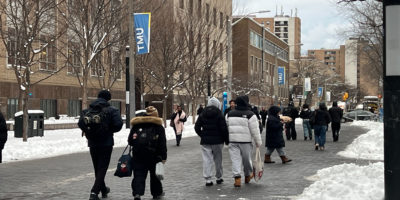By Adam Button
A group of heckling students — most from Ryerson — were thrown out of the provincial legislature as politicians debated during the second reading of a proposed bill that could see for-profit private universities operating in Ontario by September.
Last Wednesday was the first of two days of heated debate about Bill 132, the Postsecondary Education Choice and Excellence Act. If passed, it would also let several colleges offer applied degrees and allow the government to fine individuals up to $25,000 for defrauding OSAP.
As part of the legislation, a Quality Assessment Board made up of representatives from the public and private sector will be formed to judge each application.
About 15 students sitting in the member’s gallery just after 7 p.m. Wednesday jeered loudly as Dianne Cunningham, Minister of Training, Colleges and Universities, boasted about the United States’ “extremely healthy system of high-quality public universities,” combined with an array of private universities.
Acting house speaker Mairlyn Mushinski warned the visitors they would be asked to leave if they didn’t quiet down.
Minutes later, Queen’s Park security officials led them out of the debate.
A third reading of the controversial bill has to take place before the legislature votes, but a time for that debate hasn’t yet been scheduled.
“It is time for us to face reality,” Cunningham continued after the student were ejected. “Students require more, not fewer, opportunities right here in Ontario, close to home where they have the support of their families and friends, and where the resources are not as expensive.”
The debate intensified as it got late into the night.
Liberal Tony Martin (Sault Ste. Marie) was forced by the Deputy Speaker of the House to withdraw a statement he made suggesting the ruling Tories were liars. He claimed that although Cunningham promises the new degree granter won’t be publicly funded, they’ll still indirectly dip into taxpayers’ wallets.
“In the United States, 30 per cent of operating revenue for private universities comes from direct or indirect government subsidies,” Martin said. “In Ontario, they will get public dollars through OSAP, tax credits and tax incentives, while out public institutions are starved for funds.”
The proposed law has the potential to hurt Ryerson students the most, said Odelia Bay, RyeSAC’s v.p. education, because they’re enrolled in the same high-tech programs many of the new private institutions are likely to offer.
“When you have an institution with the same programs as Ryerson, and they’re charging $20,000 a year for tuition, what’s to say that Ryerson won’t up the fees as well?” she asked.
The new plan does nothing to deal with problems currently facing post-secondary education, said Rosario Marchese (Trinity-Spadina), the NDP’s education critic.
“Who’s asking for this?” he asked. “It’s deception, it’s deliberate. People should go to jail for saying those things, because nobody has been asking for it.
“It’s the lobby groups [who want this] and those who are in the market to make money on education,” he said.











Leave a Reply